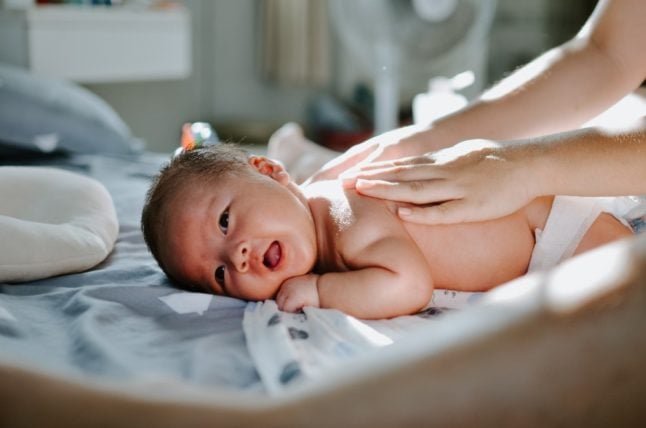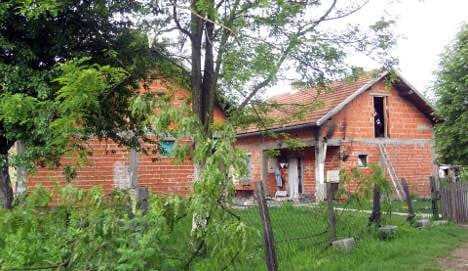The German government has been struggling for a long time to come up with a draft budget for 2024. Now it finally has laid one out – and one of the planned cuts concerns parental allowance (Elterngeld).
The traffic light coalition wants to halve the income limit for Elterngeld, which parents receive during their Elternzeit (parental leave), from the previous limit of €300,000 brutto.
Family Minister Lisa Paus (Greens) has said she regrets the cut, but found it necessary to make the saving.
READ ALSO: Germany to trim overall budget in 2024 as it invests more in defence
What is Elterngeld?
In Germany, those who work less or not at all after the birth of their child receive Elterngeld for up to 14 months. New mothers who are employees also receive fully-paid Mutterschutz, in which the employer pays in full for six weeks before the birth and eight weeks afterwards.
Elterngeld, available to both mothers and fathers, is intended to provide financial support for families and single parents, and to give parents the opportunity to take time for their new child, as the Ministry for Family Affairs wrote.
The amount of Elterngeld depends on how much the respective parent earned before their child’s birth, but is capped at €1,800 per month.
READ ALSO: Everything you need to know about parental leave in Germany
Who receives Elterngeld?
All parents in Germany who look after their child, and who do not work more than 32 hours per week, qualify for the benefit. Unemployed people, students and mini-jobbers also qualify, as do freelancers and civil servants.
Those who receive Bürgergeld or social assistance, or who are asylum seekers, are also entitled to Elterngeld – in these cases, however, it is counted in full as income against these benefits.
Currently, only couples who earn €300,000 or less per year together receive Elterngeld. For single parents, the limit is capped at €250,000.
Top earners who are above these limits do not need special support to bridge the parental leave financially, the Ministry for Family Affairs has argued.
READ ALSO: From Elternzeit to midwives: An American’s perspective on having a baby in Germany
What changes are now expected?
The federal government wants to curb the “spending dynamics” of parental allowance, in other words: it wants to save money. The monthly amount is not to change, but rather the group which receives it.
This would affect about 60,000 families. It is not yet known which changes are planned for single parents.
In the coming year, expenditure is to be reduced by €290 million to just under €8 million compared to this year, as reported by Der Spiegel.

What are the critics saysing?
The cabinet wants to pass the draft budget this Wednesday: The changes come at short notice and could catch some couples off guard if they are expecting a child and have firmly planned on Elterngeld.
Critics also fear that the planned cuts would hit couples with similar incomes particularly hard. In that case, half of the household income would be lost during the parental leave of one parent. If one parent earns significantly more than the other, it could become much more difficult for families to share parental leave between partners at all.
Paus admits that this is “no highlight” for the equality of women. However, she said that, for her, it was important not to cut the benefit itself for those who need Elterngeld.
How is the proposal seen within Germany’s coalition government?
For the Greens and the FDP this is now another point of contention. Among others, Free Democratic parliamentary group vice-chairman Christoph Meyer said that the lowering of income limits was Paus’ own “free decision” and that “saving elsewhere is possible”.
The Greens disagree, pointing out that FDP party head Christian Lindner had specified cuts in parental allowance when discussing the budget and that Paus’ ministry then implemented this as fairly as she thought was possible.
What was and is the purpose of Elterngeld?
Germany introduced Elterngeld in 2007, mainly at the instigation of the Social Democrats (SPD). It was intended to try to increase the low birth rate, especially among higher-earning male and female academics.
At that time, the birth rate in Germany was 1.36 children per woman – one of the lowest in the world.
The benefit functions primarily as income compensation for the parent who stays at home. For women in particular, it should reduce the risk of financial dependence. At the same time, it should make it easier for young families to reconcile family and work.
An incentive was created for the higher-earning parent (usually the man) to also take parental leave. Therefore, the law was seen as an important factor for a more equal sharing of childcare.
According to the explanatory memorandum to the law, child-related income losses still lead to “irreparable financial disadvantages” for women and increase “poverty risks”.
How much Elterngeld is paid at the moment?
The parental allowance is available in different variants. The “basic parental allowance” is available to both parents for a total of 14 months after the birth. It amounts to between €300 and €1800 per month, depending on how much the parent earned before the birth.
Each parent can claim two to twelve months of “basic parental allowance”. Single parents receive up to 14 months of parental allowance. The “Elterngeld Plus” is available for twice as long; it is aimed at parents who are already starting to work part-time again. The amount depends on how much they earn after the birth of their child.
There is also the possibility of receiving a “partnership bonus” for up to four additional months. This allows couples to work between 24 and 32 hours a week in parallel.



 Please whitelist us to continue reading.
Please whitelist us to continue reading.
Member comments